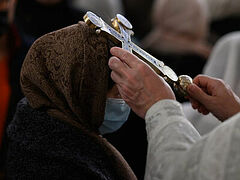The battle of spirit and flesh
Now let us try to find a way to deliver ourselves from the captivity of sin, to overcome the evil lust hiding within us. Who hasn’t noticed within himself the struggle of the spirit with the flesh, the enmity between good and evil? And who doesn’t sigh under the yoke that the Lord has imposed on all the sons of Adam? The Apostle Paul says: But I see another law in my members, warring against the law of my mind, and bringing me into captivity to the law of sin which is in my members. O wretched man that I am! who shall deliver me from the body of this death? (Rom. 7:23–24)—from the law of the flesh, which injures and causes death to the soul?
The soul is struck and confounded by the lawless gratification of excessive carnal desires, negligence, and complete cooling towards virtue. From this comes the continual forgetfulness of God, which is the death of the soul, its languor and sorrow—first temporary, then eternal. Whoever wants to avoid this death should learn as much as possible about the law of the Lord and call on His help. The revelation of the Lord is a spiritual light that enlightens the mind and brings the soul out of the shadow of death (cf. Mt. 4:16); and the remembrance of the Lord is the life of the soul, or, what’s the same, unceasing joy in the Lord.
Hope in God’s help and the destruction of pride
Nothing makes the soul so weak and negligent in the work of salvation as self-love and self-will—the forebears and feeders of carnal passions; therefore, you must reject them and force yourself to do good. Labor and humility are necessary for those who want to be free from the captivity of sin. And David cried out: Behold my lowliness and my toil, and forgive all my sins (Ps. 24:18). Sin reigns in proud hearts, but grace abides in the humble (cf. Jas. 4:6, 1 Pt. 5:5)—and the kingdom of evil is destroyed.
God restores a contrite heart in hope and raises one who is conscious of the poverty and wretchedness of his soul from the festering passions; therefore, you mustn’t despair when you see yourself in spiritual misery, dying from sinful wounds. Or as St. Philaret, the Metropolitan of Moscow says, “Use the feeling of weakness not unto despair, but to reject hope in yourself and hope in God by prayerfully entreating His help.” For the Lord always shows His saving power in our impotence and weakness: My strength, He says, is made perfect in weakness (2 Cor. 12:9).
“From my youth many passions have fought against me, but do Thou help me and save me, O my Savior” (Matins, Antiphon 4th Tone), the holy Church sings on behalf of the saved, those who have been liberated from enslavement to sin by the power of God. For carnal passions do not cease to battle the soul for a long time, until a man is completely convinced that it’s not by his own wisdom and diligence but by God’s help and intercession that he is liberated from the captivity of sin. If a man is not temporarily abandoned and scorned by God Himself, as if completely enslaved to the law of sin that operates in his members (cf. Rom. 7:23), such that he can find help neither by his works nor from God, then he won’t come to know himself, he won’t be broken in heart, and won’t consider himself the last, the worst of all. In this is manifested God’s providence for the saved, to humble them and then elevate them to the height of passionlessness, of the blessed life.
This is why the passions of the flesh war against us, so that we might know our infirmity, like David, who said: Deliver me, for a poor man am I and a pauper (Ps. 108:21); so that we might place our salvation in God alone: For He shall save his people from their sins (Mt. 1:21). Therefore, it’s impossible to have freedom from carnal desires and to be pure of passionate thoughts as long as a man hopes in himself. But whoever maintains humility, contrition, and hope in the mercy of God is granted a portion among the saved and is counted among the righteous; and the Lord will say to him, as to the Apostle Paul: My grace is sufficient for thee (2 Cor. 12:9). “I am the Lord Thy God Who has mercy on thee and heals all thine afflictions.”
Don’t marvel as though it’s something strange if you see yourself powerless in the battle with sinful lusts, and don’t think that this happens to you alone: Many of the saints have endured the same. Listen to how St. Gregory the Theologian laments his misfortunes:
Oh, my soul, how sinful and worthy of punishment you are! Oh, mortals, how vain and insignificant is our pride! And a light wind already shakes us. Everything in man is impermanent—both the good and the evil: Both are close to each other. The evil man doesn’t know what his end will be, and the good man can’t assure he will always be virtuous. As a youth, innocence guided me and chastity subdued my senses and kindled fervent love for the wisdom of God in my heart. But now, despite the knowledge I have gained, despite my mature age, I can barely drag my feet like a drunkard: The enemy secretly creeps into my heart and steals my good intentions. Sometimes my spirit soars to God, and sometimes it plunges into the abyss of the world that has inflicted so many wounds upon my soul. But though sin dominates me, although the enemy drowns me in the waters of lawlessness, although I see my condition, I know who I am and where I would like to ascend to. I see the depth of my fall and the whole abyss into which I may still plunge.
Another saint, Venerable Isaac the Syrian says:
When we surrender ourselves to an inexperienced mind and we begin to do unseemly things again, then we will not be negligent about correcting our lives, for the righteous also have a tendency to sin; but remaining in sin is a consequence of the deadening of the soul. God replaces the fulfillment of His commandments with repentance, and imputes to us sorrow for sins instead of virtues—such is the goodness of God! But whoever, hoping in repentance, gives himself over to sin, and turns God’s grace into indulgence in sin thereby sinning grievously, does not reach the state in which he could be cleansed from sins, and thus he dies an unrepentant sinner.
Thus, let us not neglect our salvation; let us not despair of correction, in either case adding sin to sin. The Lord hath commanded no man to do wickedly, neither hath he given any man licence to sin (Sir. 15:20). And if the righteous scarcely be saved, where shall the ungodly and the sinner appear? (1 Pt. 4:18). A wise man will fear in every thing, and in the day of sinning he will beware of offence (Sir. 18:27). He will turn to the Lord with all his heart and will pray before Him day and night until iniquity passes away (Ps. 56:3); he shall surely live, he shall not die. None of his sins that he hath committed shall be mentioned unto him (Ezek. 33:15-16).





